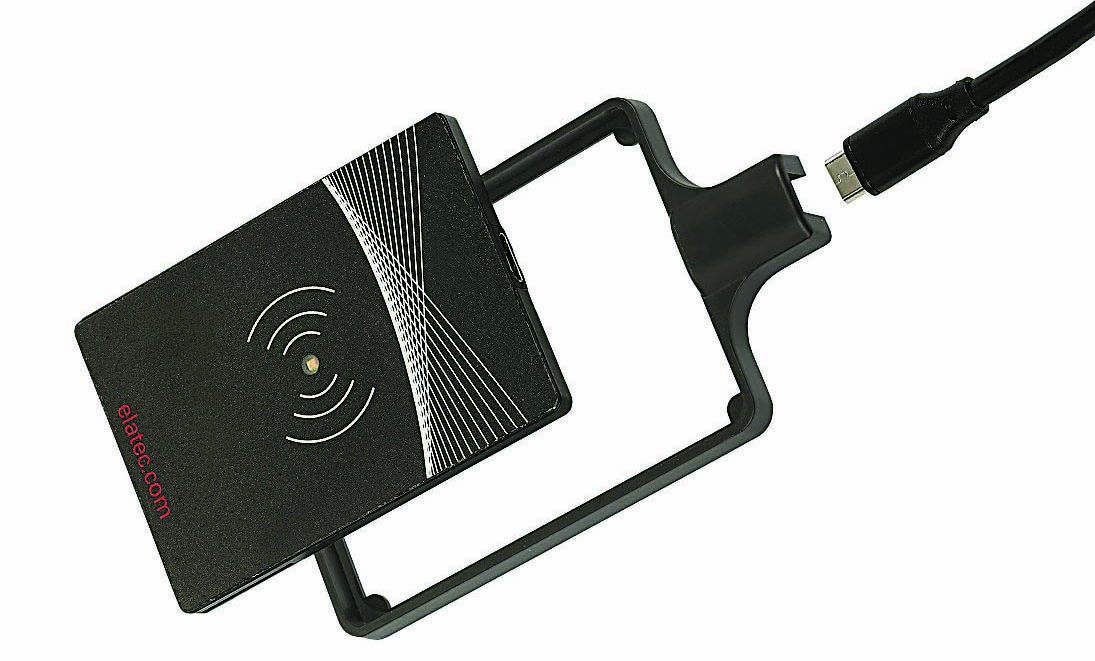Process and workforce optimization
Process and workforce optimization
Caron Engineering needed a smart, secure RFID reader to perform five key functions.n
Established in 1986, Caron Engineering Inc. develops advanced sensor and monitoring technology to optimize performance, productivity and profitability for the machine tool industry.
Based in Wells, Maine, Caron Engineering's manufacturing products are sold worldwide and interface with virtually all CNC machine tools on the market. These products use sensors and high-speed data processing units to make real-time automated adjustments, optimize machining and provide valuable information about the cutting process and the machine's health. Finding and retaining skilled operators is increasingly tricky for the company's customers. As a result, operator training demands are high, and so there is a need for workforce tracking and continuous process optimization.

Caron Engineering needed a smart, secure RFID reader that would allow them to add operator authentication and log-in to its solutions for customers that perform CNC machining and to enable those customers to use their current employee badge system. The reader needed to perform five functions:Provide secure and accurate user identification, authorization and access control.Read all the RFID card technologies its clients might be using.Be easy to reconfigure for new technologies and functionality.Mount cleanly and securely to the exterior controls area of their machines.Be able to withstand industrial environments.Caron Engineering realized that the "who" is typically the missing link in manufacturing data. Understanding operator identity is the key to enabling data-driven decisions in the modern factory. Machine authentication allows plants to incorporate worker activity at a granular level within the production environment and ensures that only trained, authorized operators can access machine controls.Secure and reliable machine operator authentication provides the data Caron Engineering customers need to enable process and workforce optimization. Image courtesy of Elatec
When there is access control, machine access control is typically done with physical keys — keys often left in the machine, lost or shared among the workforce. Or access control is enabled using passwords and PINs, often forgotten or likewise shared among staff, including staff who shouldn't be touching the equipment or performing a specific function. Generally, there is no traceability, and when something goes wrong, the responsible party is not known.
Caron Engineering and its customers required an RFID reader to integrate with their MiConnect CNC interface software to ensure only authorized operators could access equipment and specific software. They also needed authentication to ensure operators were adequately trained and for traceability reporting and improvement purposes. With the shortage of skilled operators, such training is essential for process optimization.
The TWN4 Slim reader from Elatec Inc. in Palm City, Florida, met Caron Engineering's requirements. The Slim is configurable for all the major RFID card transponder technologies used worldwide, maximizing the company's market opportunities and helping to better serve customers using multiple technologies. Elatec's customers use the same corporate ID cards for building entry to grant authorized employees access to their manufacturing software and equipment. With its flexible architecture and open API, the Slim reader can be remotely re-configured to activate new card technologies or upgrade firmware to meet emerging security and functionality requirements. Or a contactless card may be presented to the reader — no touch labor required.

The Elatec TWN4 Slim reader is compatible with all major RFID badge technologies worldwide. Image courtesy of Elatec
"RFID-enabled machine operator authentication provides a check and balance," said Rob Caron, CEO of Caron Engineering. "It helps eliminate errors by knowing exactly which operator is doing what and allows reporting back to the operator for improvement and where training is needed. They have accountability through the badge reader system."
The Slim is integrated with the Caron Engineering middle- and back-end software, so every time an operator or maintenance worker runs the equipment, it is logged along with who did it, when they did it, and what actions they performed. Caron Engineering has hundreds of its MiConnect software applications installed in locations around the world. Where it has been implemented with the TWN4 Slim reader, it reportedly provides secure, reliable machine operator authentication and access control to help customers ensure workforce training authorization and safety to optimize manufacturing processes.
Integrating the Elatec TWN4 Slim reader has benefited Caron Engineering's machining customers, according to Elatec. Firstly, the seamless integration of the Slim reader with existing corporate ID cards has streamlined access control processes. Authorized employees conveniently use their familiar ID cards, eliminating the need for additional access credentials and reducing administrative burden. Secondly, the comprehensive traceability of the Slim reader with MiConnect software enables effective monitoring of operator activities. Detailed information, including the operator, timestamp and equipment used, is tracked, fostering accountability and facilitating targeted analysis for troubleshooting and process improvement.
Lastly, the Slim reader's flexible architecture and open API ensure future-proof functionality. Elatec reports that remote reconfiguration capabilities allow easy adaptation to new card technologies or firmware upgrades, ensuring compatibility with evolving security standards and industry requirements. Implementing the Elatec TWN4 Slim reader empowers Caron Engineering's customers with enhanced workforce management, improved security and optimized manufacturing processes.
"Our goal is to provide turnkey solutions for our customers to optimize and control their production processes," Caron said. "Machine operator authentication and tracking with Elatec RFID badge readers helps us do just that."





